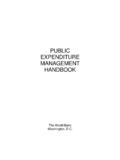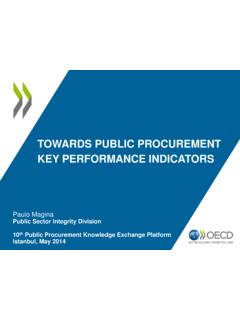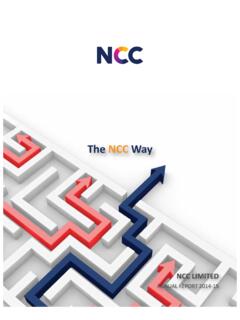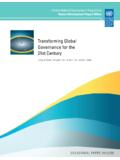Transcription of HOSPITAL GLOBAL BUDGETING - who.int
1 HOSPITAL GLOBAL BUDGETING Robert Dredge September 2004 Health, Nutrition and Population (HNP) Discussion Paper This series is produced by the Health, Nutrition, and Population Family (HNP) of the world bank 's Human Development Network (HNP Discussion Paper). The papers in this series aim to provide a vehicle for publishing preliminary and unpolished results on HNP topics to encourage discussion and debate. The findings, interpretations, and conclusions expressed in this paper are entirely those of the author(s) and should not be attributed in any manner to the world bank , to its affiliated organizations or to members of its Board of Executive Directors or the countries they represent.
2 Citation and the use of material presented in this series should take into account this provisional character. For free copies of papers in this series please contact the individual authors whose name appears on the paper. Enquiries about the series and submissions should be made directly to the Editor in Chief. Submissions should have been previously reviewed and cleared by the sponsoring department which will bear the cost of publication. No additional reviews will be undertaken after submission. The sponsoring department and authors bear full responsibility for the quality of the technical contents and presentation of material in the series.
3 Since the material will be published as presented, authors should submit an electronic copy in a predefined format as well as three camera-ready hard copies (copied front to back exactly as the author would like the final publication to appear). Rough drafts that do not meet minimum presentational standards may be returned to authors for more work before being accepted. The Editor in Chief of the series is Alexander S. Preker For information regarding this and other world bank publications, please contact the HNP Advisory Services at: Tel (202) 473-2256; and Fax (202) 522-3234.
4 ISBN X-XXXXXX-XX-X 2004 The International bank for Reconstruction and Development / The world bank 1818 H Street, NW Washington, DC 20433 All rights reserved. ii Health, Nutrition and Population (HNP) Discussion Paper HOSPITAL GLOBAL BUDGETING Robert Dredgea aProgram Manager for Financial Reforms, Department of Health, England, and Senior Fellow, Centre for Health Planning and Management, Keele University, England. Paper prepared for the world bank s Resource Allocation and Purchasing Project Abstract: This paper is a practitioners guide to the introduction of a GLOBAL budget into a HOSPITAL setting based on real world bank projects in emerging, former soviet countries and in the UK NHS.
5 It traces the steps from a centrally allocated, line item type allocated budget to one that is set on predetermined objective and measurable factors. These are based, where possible, on the health needs of the population served by the HOSPITAL . It considers how a GLOBAL budget can be established and managed to generate local ownership and commitment to its delivery. It deals with incentives for both efficiency and performance. Examples of different contracting regimes, and how they fit into a GLOBAL budget framework are given. Mechanisms for the periodic revision of the budget for issues such as inflation are given. There are separate notes on how a GLOBAL budget can fit into a policy regime, how to cost services, and how to arrange contract for individual services.
6 There are also suggestions on how to fund special payments that may vary from year to year, such as capital, research and development and Training and Education. Keywords: resource allocation and purchasing, health care financing, GLOBAL budgets, contracting, costing HOSPITAL services. Disclaimer: The findings, interpretations and conclusions expressed in the paper are entirely those of the authors, and do not represent the views of the world bank , its Executive Directors, or the countries they represent. Correspondence Details: Bob Dredge, Senior Fellow, Centre for Health Planning and Management, Darwin Building, Keele University, Keele, Staffordshire, England.
7 : Tel 0044 1782 583191; email iii iv Table of Contents PURCHASER THE BUDGET 3 THE GLOBAL HOSPITAL GLOBAL GLOBAL BUDGETING SETTING THE HISTORIC NORMATIVE LINE MIXED PERFORMANCE INCENTIVES THROUGH PURCHASER/PROVIDER EFFICIENCY NON BUDGET SPECIFIC PURPOSE RESEARCH AND ANNUAL COSTING CENTRAL COMMERCIAL PRIVATE FINANCE BLOCK MANAGING THE v APPENDIX 1: INTEGRATION WITH BROADER HEALTH IMPACT OF A GLOBAL APPENDIX 2: A NOTE ON WHICH WHICH CONTACT WHEN?..41 DURATION OF APPENDIX 3: A NOTE ON ATTACHMENT 1: COST BEHAVIOUR SEMI FIXED ATTACHMENT 2: COST CLASSIFICATION (ENGLISH EXAMPLES).
8 54 vi FOREWORD Great progress has been made in recent years in securing better access and financial protection against the cost of illness through collective financing of health care. This publication HOSPITAL GLOBAL BUDGETING by Bob Dredge is part of a series of Discussions Papers that review ways to make public spending on health care more efficient and equitable in developing countries through strategic purchasing and contracting services from nongovernmental providers. Other guides will cover topics on case mix payments and ambulatory provider payments. Promoting health and confronting disease challenges requires action across a range of activities in the health system.
9 This includes improvements in the policymaking and stewardship role of governments, better access to human resources, drugs, medical equipment, and consumables, and a greater engagement of both public and private providers of services. Managing scarce resources and health care effectively and efficiently is an important part of this story. Experience has shown that, without strategic policies and focused spending mechanisms, the poor and other ordinary people are likely to get left out. The use of purchasing as a tool to enhance public sector performance is well documented in other sectors of the economy.
10 Extension of this experience to the health sector is more recent and lessons learned are now being successfully applied to developing countries. The shift from hiring staff in the public sector and producing services in house from non governmental providers has been at the center of a lively debate on collective financing of health care during recent years. Its underlying premise is that it is necessary to separate the functions of financing health services from the production process of service delivery to improve public sector accountability and performance. In this Discussion Paper, Dredge provides a useful guide for policy makers introducing or reforming GLOBAL budgets in the HOSPITAL sector.
















